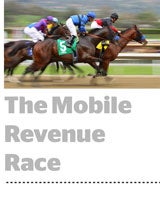 Facebook and Google have emerged as the front-runners in the race to capture mobile ad dollars, with Google leading the charge.
Facebook and Google have emerged as the front-runners in the race to capture mobile ad dollars, with Google leading the charge.
Facebook’s efforts to extend its mobile reach and rapid growth has made it a strong contender for first place, but can the behemoth social network overtake Google’s hold on mobile advertising? It is difficult to say, according to analysts, who offered a wide range of predictions.
Google claimed 49.3% of net mobile ad revenue share worldwide last year, down slightly from 52.6% in 2012, according to a new report from eMarketer. Facebook came in second with 17.5%, up from 5.4% the previous year.
Even though Google still holds the lion’s share of the mobile ad market, the research firm predicts Google’s share will drop further to 46.8% this year, as Facebook continues to gain steam and is forecast to capture 21.7% of the mobile ad market in 2014.
But despite its growth, Facebook has a long way to go before it can bypass Google in mobile ad spend, according to Constellation Research principal analyst Ray Wang.
“It’s hard to see Facebook overtaking Google in this decade,” Wang said. “While the growth at Facebook has been quick, the tie back to commerce isn’t there. Google has built multiple entry points to bring search, mobile ads and commerce together. You need that kind of synergy to win the long game. Facebook will need more partnerships first before they can overtake Google.”
Gartner Research VP Mike McGuire agreed.
“Google may be slowing down while Facebook is growing quickly, but [Google] still holds a significant advantage in terms of search and its reach,” McGuire said. McGuire also noted that Google Chromecast (a device that lets users connect online content on a smartphone to a television screen) offers “a lot of potential for Google and makes the interplay between mobile devices and television more interesting.”
Karsten Weide, VP of media and entertainment at IDC, took a more optimistic view and suggested Facebook “will at least come very close” to bypassing Google in mobile ad revenue this year. “If it doesn’t happen this year, it will probably happen next year,” Weide said.
Both Google and Facebook are focused on helping mobile app developers monetize their apps in a bid to drive more revenue. Google unveiled several enhancements on Tuesday to its AdMob network to help developers streamline their monetization efforts.
The new features include in-app purchase ads, adding Google Analytics to AdMob and ad network-optimization tools that make it easier for developers to claim revenue from multiple ad networks in AdMob’s mediation stack.
For its part, Facebook has been experimenting with a mobile ad network that would allow the company to show its ads in third-party mobile apps and provide it with another source of revenue.
Inserting Facebook-brokered ads into apps outside of the social network greatly extends the social network’s reach and pits it against Google’s AdMob network. To lure advertisers, the social giant could leverage its mountain of user data to target its ads.
In a blog post about the test, Facebook engineer Sriram Krishnan wrote that the company will be extending its “rich targeting to improve the relevancy of the ads people see, provide even greater reach for Facebook advertisers, and help developers better monetize their apps.”
To maintain its targeting capabilities, however, Facebook must be able to continue leveraging its user base and mining its data for insights.
“Continuously growing your user base is a challenge that many companies face and Facebook is no different,” McGuire said. “But Facebook seems to be aware of this issue, and so it’ll be interesting to see how this unfolds.”












